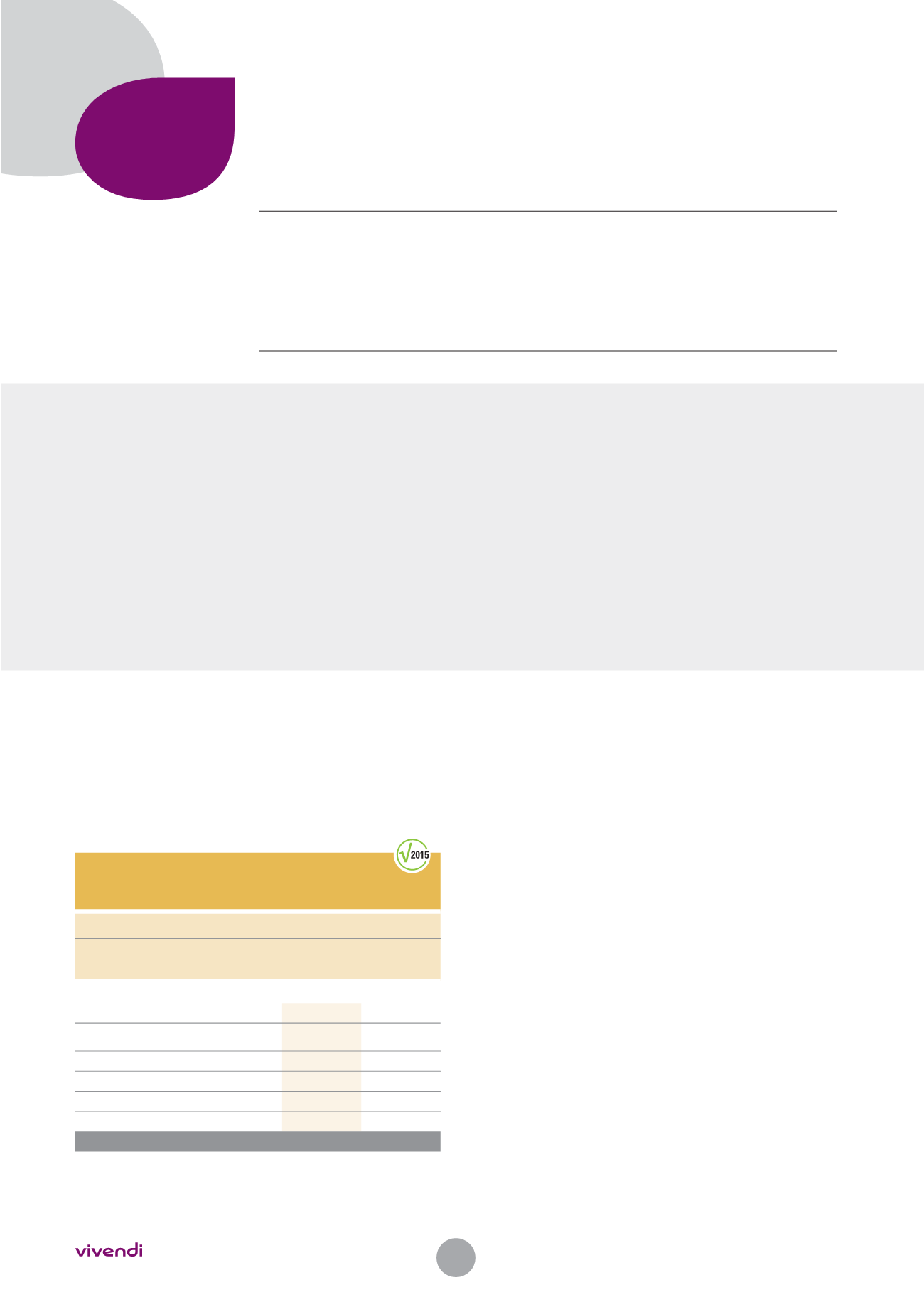

Environmental information relates to the following respective scopes, as
specified in the Note on Methodology (see Section 7.1 of this Handbook):
◆
Universal Music Group: limited to a group of nine countries (Australia,
Brazil, France, Germany, Japan, Netherlands, South Africa, United
Kingdom and the United States) representing 81% of total revenues
of the group;
◆
Canal+ Group: companies located in France, Africa (a focus group
of seven countries: Canal+ Burkina Faso, Canal+ Cameroon, Canal+
Congo, Canal+ Gabon, Canal+ Ivory Coast, Canal+ Madagascar and
Canal+ Senegal), Poland, and Vietnam;
◆
Vivendi Village: Vivendi Ticketing, MyBestPro, Watchever, L’Olympia.
These entities are included in the extra-financial reporting scope
in 2015 and have returned only a limited number of environmental
indicators, considering their activities (indicators with data not
collected are identified by “na”); and
◆
Corporate (Paris headquarters).
The abbreviations or acronyms used in the tables showing the indicators
are provided in detail on p. 3.
In 2015, the process of improving the collection of environmental data
continued. This was reflected in the increased reliability of data and
the extension of the scope of reporting with the inclusion of the Vivendi
Village entities in particular.
Environmental
Indicators
6.1. General Environmental Policy
The group’s business units with little exposure to environmental risks
prepare their own action plans to measure and control their impacts. The
methods used include energy assessments, certifications, training and
information sessions for employees.
ENERGY ASSESSMENT AND EVALUATION
OF ENVIRONMENTAL IMPACTS CARRIED OUT
(NUMBER OF ASSESSMENTS)
GRI
UNGC
OECD
G4-DMA Environment,
G4-EN31
7, 8
VI.1.a
2015
2014
UMG
10
6
C+G
3
0
Of which SECP
1
0
Vivendi Village
0
-
Corporate
0
1
Total
14
7
In 2015, Canal+ Group performed an energy audit at several sites
in France with two objectives: to improve its energy efficiency and to
meet its obligations under French regulations (Law of December 2, 2015
imposing several measures to comply with the law of the European Union
on risk prevention).
UMG expanded measurement of its environmental impacts and, more
specifically, the energy impacts of its buildings. The sites in the United
Kingdom, for example, received a one star award issued by the NGO
Julie’s Bicycle and received ESOS certification (Energy Saving Opportunity
Scheme), primarily because of their efforts to improve management of
their energy consumption. The audits conducted highlighted measures
for the replacement of the printers with equipment which consumes less
energy and for the reduction of cooling in the server rooms.
UMG Germany performed an energy audit, in accordance with the
new German regulations, which resulted in a significant collection
of data, the identification of areas for improvement, and allowed the
company to define a corrective action plan for 2016. In California, the
UMG headquarters in Santa Monica and the Woodland Hills sites also
continued their initiatives to control their energy consumption, and did so
within the framework of the environmental certifications they received.
6
6.1. General Environmental Policy 58 6.2. Pollution and Waste Management 60 6.3. Sustainable Use of Resources 61 6.4. Climate Change 63 6.5. Information Categories Deemed Irrelevant with Regard to the Group’s Businesses 64EXTRA-FINANCIAL INDICATORS HANDBOOK
2015
58


















